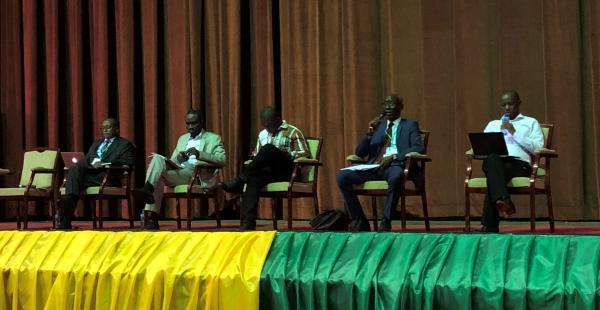
Explaining Modalities, Procedures and Guidelines (MPGs) and Support Programmes
As part of an event on transparency, co-organized by PATPA during the Africa Climate Week, about 80 participants learned about Modalities, Procedures and Guidelines (MPGs) for the Enhanced Transparency Framework, and support programmes. During a panel discussion, countries were able to reflect on challenges, experiences and lessons learnt.
The Africa Climate Week took place on 18-22 March 2019 in Accra, Ghana. This was the 1st Regional Climate Week that was followed by the ‘Latin America and Caribbean Climate Week’ in August and the ‘Asia-Pacific Climate Week’ in September. All Regional Climate Weeks created an exchange forum for governments and various key stakeholders, like practitioners, sub-national actors, civil society, representatives from different agencies, etc., to discuss climate change issues on a regional level. The outcomes of all three climate weeks had been transferred to the United Nations Secretary-General Climate Action Summit that took place on 23 September in New York.
The week was filled with several events. During the Pre-Summit on 18-19 March, a couple of closed one- or two-day events, like the 10th Regional Dialogue on Nationally Determined Contributions (NDCs), took place. Day 3 was covered by several high-level meetings on different topics, like the Outcomes of COP24, NDC Implementation, Carbon Pricing & Markets, etc. On day 4 various sessions on three main topics took place: Energy Transition, Nature-Based Solutions, Cities & Local Action. The last day was kicked-off by a Transparency Event followed by events on Innovation & Investment and Climate Youth Action. Finally, the week was closed by a concluding event in which the key outcomes of the week had been presented to the audience.
PATPA co-organized the Transparency Event on 22 March together with the UNFCCC, the UNEP DTU Partnership and the FAO. Under the title, “Enhanced Transparency Framework after Katowice – support initiatives and country perspectives” key actors discussed the latest developments and first experiences with the ETF and the support received. After Katowice, it was crucial to brief the audience on the outcomes of the negotiations on transparency as well as on support programmes available in order to ensure developing countries will soon be able to fulfill the same reporting requirements as the developed countries.
The update on the ETF by the UNFCCC was followed by presentations on PATPA, CBIT and ICAT. The core part of the event was a panel discussion in which Ghana, Benin, Zimbabwe and Senegal discussed challenges on implementing the ETF and experiences with international support initiatives. As a conclusion, it is key to provide further fora for peer-to-peer exchange to ensure countries can learn from each other. It was also noted that not all initiatives and their respective support programmes are well known. Finally, we learned that a good collaboration between agencies is key to provide the most efficient support to countries.

